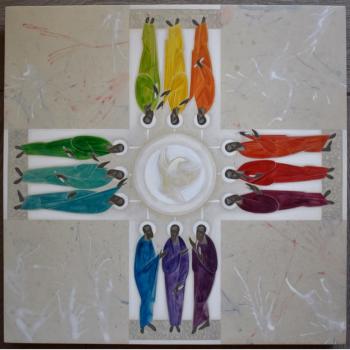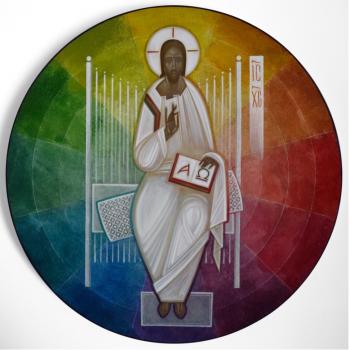
This is Part 2 in a series of posts exploring the question “Should all Christians become vegetarians?”
In Part 1, I tried to lay the foundation for why this question is one that Christians, particularly American Christians, ought to take seriously.
I concluded the first part with the great quote from Alasdair MacIntyre: “I can only answer the question ‘What am I to do?’ if I can answer the prior question ‘Of what story or stories do I find myself a part?’” In Part 2, I will outline a biblical theology of creation in order to help locate ourselves in the biblical metanarrative. This will help us answer the foundational questions: “Who is God?”, “Why did God create the world?”, and “What are humans for?” As we do this, the answer to our central question “Should all Christians become vegetarians?” will come into sharper focus.
Framework Hypothesis
Genesis 1 is the best place to begin exploring who God is, why He created the world, and what humans are for. The point of the first chapter of Genesis is not to highlight how God created the world (and definitely not how long it took!). The primary point is the Genesis 1 is why God created the world.
One of the best ways to understand the meaning of Genesis 1 is through the interpretive lens of the Framework Hypothesis. This hermeneutic avoids an overly literalistic interpretation with a focus not so much on the chronological progression of the days but the logical connection between the days.

Looking at Genesis 1 through this framework really opens it up. Construed this way, Days 1-3 (first triad) correspond to Days 4-6 (second triad). At one level, Days 1-3 describe habitations and Days 4-6 outline the corresponding inhabitants. At a deeper level, Days 1-3 describe the realms and Days 4-6 outline the corresponding rulers. The interpretive key is first found in Day 4 and then again in Day 6.
On Day 4 God created the sun, moon, and stars. These are the inhabitants of the day and of the night (habitations). More specifically, we read God made the sun to rule the day and the moon to rule the night – “And God set them in the expanse of the heavens to give light on the earth, to rule over the day and over the night, and to separate the light from the darkness” (Gen 1:17-18).
We see a similar governing motif on Day 6, when God creates human beings. We read that God created human beings in the “image of God.” It’s tempting to import other ideas into the text here about what it means to be made in the image of God. For example, some argue that to be made in the image of God is an ontological description, referring to something about our essence that distinguishes us from other creatures (e.g., we have souls, we have reason, etc.). However, in the context of Genesis 1 and 2, the image language is clearly functional. It refers to the role humans are to play as rulers over the earth. Human beings are vice-regents who represent God in the world. As the image of God, humans are to represent God in the world, acting as if God would act.
As Norman Wirzba notes in The Paradise of God, image bearers “are called upon to bear witness and emulate the creator’s intention.” To this intention we now turn.
Cultural Mandate
I want to highlight two key passages in understanding the purpose for which human beings were created. Together, these comprise what theologians call the Cultural Mandate.
26 Then God said, “Let us make man in our image, after our likeness. And let them have dominion over the fish of the sea and over the birds of the heavens and over the livestock and over all the earth and over every creeping thing that creeps on the earth.” 27 So God created man in his own image, in the image of God he created him; male and female he created them. 28 And God blessed them. And God said to them, “Be fruitful and multiply and fill the earth and subdue it and have dominion over the fish of the sea and over the birds of the heavens and over every living thing that moves on the earth.” (Genesis 1:26-28)
15 The Lord God took the man and put him in the garden of Eden to work it and keep it. 16 And the Lord God commanded the man, saying, “You may surely eat of every tree of the garden, 17 but of the tree of the knowledge of good and evil you shall not eat, for in the day that you eat of it you shall surely die.” (Gen 2:15-17)
In these verses, we read that to be made in the image of God means to be entrusted with a particular function, namely exercising dominion over all that God created. Humans are to fill the earth and subdue it. Humans are “to work” the garden and “keep it.”
If we dig into the Hebrew words for these last two commands, we’ll find that this means humans are to serve the garden by helping it flourish and to protect the garden from being abused or desecrated. (I don’t have the space to talk about it here but these two verbs are the same verbs used to describe the work of Levitical priests in Israel’s temple [see Numbers 18:7]. This is in keeping with another insightful and complementary reading of Genesis 1-2 as God’s temple called the “Cosmic Temple View.”)
To bring it all together, here’s an excellent synopsis of the Cultural Mandate. Mike Metzger describes it this way in his essay “The Plus Four Solution”:
The Cultural Mandate describes the creational pattern intrinsic to the way reality works. The substance of the mandate is to be creative. The scope is all creation. The stewardship is promoting flourishing or maximizing latent potential. The Cultural Mandate explains what everyone is hard-wired to do everyday. It is the ‘human job description.’
I love the language used here. This is the human job description. As stewards of creation, our responsibility as human beings is to direct our creativity and ingenuity to cultivate the raw material of creation so that it comes to full bloom.
Three Key Points
I want to highlight a few things. The first thing I want to make note of is something that never ceases to surprise me. God’s intention for the primary means by which humans would serve, honor, and glorify God had nothing to do with the “spiritual” things we often associate with being a good Christian. It had everything to do with humans being obedient to God by fulfilling their task which was to be good farmers, tending to the plants and animals, cultivating and caring for creation responsibly. In a word, to obey the cultural mandate.
Second, I want to point out that this original human job description still applies. Obviously we’re not all farmers but the principles apply to all good work. Caring for creation is central to what it means to be human and consequently what it means to be a Christian. This is an emphasis we’ve clearly lost. When’s the last time you heard a sermon on the 21st century’s ecological crises and our responsibility to promote ecological justice?
Third, I’d like to highlight the fact that the one prohibition before the fall has to do with consumption. I find that to be very interesting, especially when considering our topic “Should all Christians be vegetarian?” The inner heart disposition could be described as pride, or rebellion, or distrust. The first sinful action was inappropriate consumption. Surely this raises interesting questions for us.
Next Steps
Surfacing the issue of consumption is a great place transition to Part 3. In this next part we’ll continue developing a biblical theology of creation with a focus on what the Scriptures have to say about death and eating meat before the fall, after the fall, and in the age to come.










